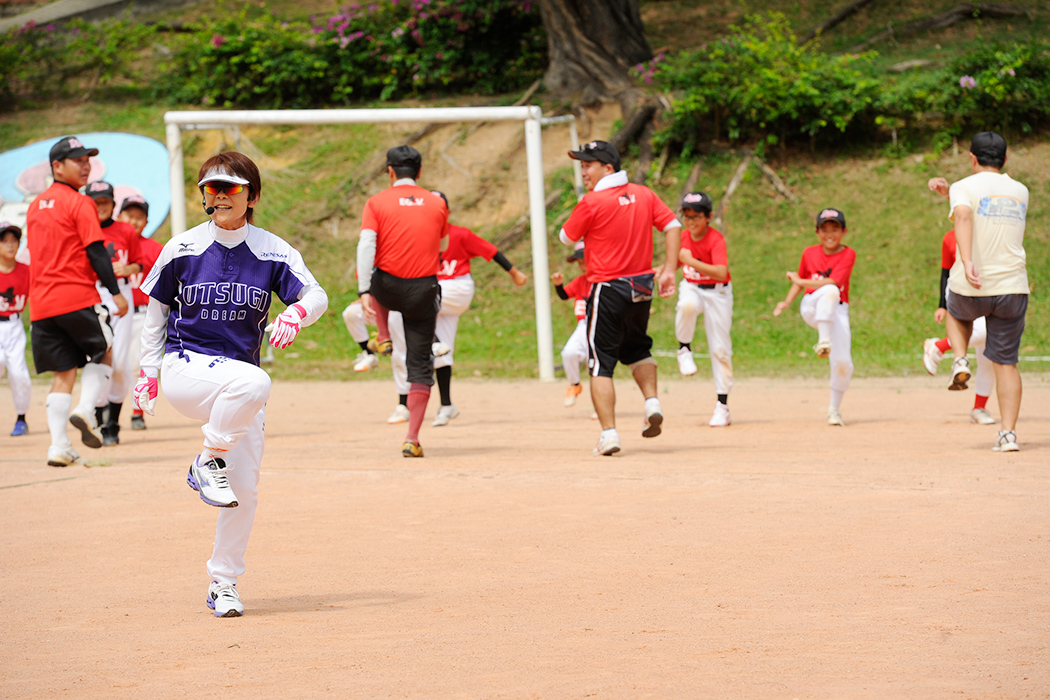
Expert Views

Taeko UtsugiFacing everyone earnestly and sincerely
First Published in Japanese in March 2024 [4 parts]
Part 3: Developing an eye for the right person for the job

“Before becoming a great player, I want them to be a great person.” Although sport is different from business, these words must have struck a chord with many readers. Our discussion is now reaching the heart of the matter: how to build a strong team. This is essential reading for everyone in business, from leaders to team members.
── As well as cultivating the players as people, winning games must have been an important part of your mission as a manager. What did you focus on in training, to build a strong team?
In order to win, you need to motivate the players. So, how do you motivate them? By showing them that practice is the only way to win. That’s why players are on the national team, after all.
So, what kind of practice leads to victory? In the end, it comes down to the basics. The skills required to hit or catch a ball can only be acquired through basic drills. But everyone hates repetitive drills, don’t they? Nobody likes running laps. But the reason Yukiko Ueno* is still playing competitively in her 40s is because she does more daily running than anyone else.
Tough training develops physical and mental strength, not just technique. A player can only become strong once three separate aspects are all in place: physical, mental, and technique. I would always tell players: “First you need to beat yourself, not your opponent.” Overcoming hardship is what helps you grow.
* Yukiko Ueno plays as pitcher for Bic Camera Takasaki Bee Queen. A legend of Japanese women’s softball, she won Olympic bronze at Athens 2004, gold at Beijing 2008, and gold at Tokyo 2020.
── The basics will always be important in whatever you do. Have you found ways to help players take on the dreaded drills in a more positive way?
I found ways to make dull, repetitive drills more exciting. For example, training warm-ups lasted about an hour. Simply running for an hour would be boring, so I changed it up a bit each day, getting the players to run in zigzags or race against each other.
Why not try incorporating small changes like this in your work? It might improve enthusiasm, concentration, and motivation.

Finding ways to make simple repetitive drills feel fresh and exciting
── You talked about clearly communicating your own policies. Did you also communicate a specific vision for the team?
I always communicated clear policies. At the first meeting of the new season, I would tell the players: “This is the kind of team I want to make.” While announcing the regular team – who is the leading pitcher, who is the catcher, who are the fielders – I would explain in detail: “This is what we will do if one of our regulars is out of action. The spare players will be used in this way, so make sure you’re ready.”
At the same time, I also had the players write down clear goals. Perhaps due to everyone clearly setting their own goals, it was rare for any of my players to get injured. They hardly ever caught colds, either – or perhaps they were just hiding it, because they would be benched if I found out they had caught a cold.
── Part of the manager’s role is picking players’ positions. How did you go about this?
It’s about looking fully at each individual and analyzing them. To do this, a leader needs to develop an eye for the right person for the job. After coaching the national team for many years, I became able to quickly spot characteristics simply by looking at a player. Not just strengths like “she’s a fast runner” or “she has a good arm”, but personality traits like “she can be a bit bold.” Then, you can assign each player to the most suitable role. I guess it must be the same in business.

Even if you give two people the same job to do, one might be able to do it well, while the other can’t. But the person who can’t do that job well might be great at a different one. Assessing and assigning the right person to the right job is an important part of the leader’s role.
Get to know each person so well that you can tell if they’re not feeling great today or seem worried about something from just their face or voice. That’s how closely I got to know my players.
── Is there anything you keep in mind while getting to know players closely?
I always make a point of treating all players equally. For example, if I want to talk to a certain player about something important, I will call the whole team. And it’s important to communicate with other players. For the sake of boosting the morale of the whole team, I think it’s important to remember that nobody should get special treatment.
These days, smartphone apps mean you can send a message to everyone at once, which makes life easy. I am currently executive manager of Tokyo International University Women’s Softball Club and senior advisor to Bic Camera Takasaki Bee Queen in the Japan Diamond Softball League. When I need to send a message to the players, I always end up sending it to sixty or seventy people at once!